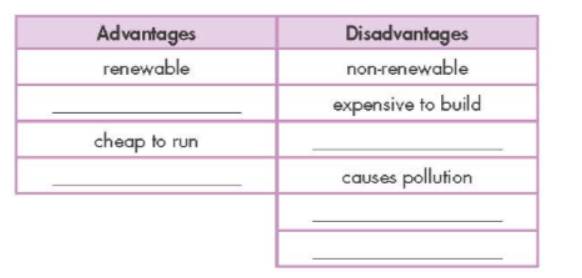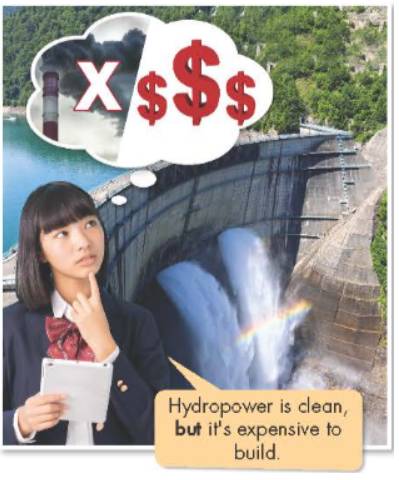a. Match the words with the pictures.
(Nối từ với bức tranh tương ứng.)

1. power plant (nhà máy điện) 2. wind turbine(tua bin gió) 3. solar panel (tấm pin năng lượng mặt trời) 4. nuclear power (năng lượng hạt nhân) |
a. Match the words with the pictures.
(Nối từ với bức tranh tương ứng.)

1. power plant (nhà máy điện) 2. wind turbine(tua bin gió) 3. solar panel (tấm pin năng lượng mặt trời) 4. nuclear power (năng lượng hạt nhân) |
b. Add each word/phrase (5–9) to the correct column. Listen and repeat.
(Thêm từng từ /cụm từ (5–9) vào đúng cột. Lắng nghe và lặp lại.)

5. dangerous (nguy hiểm) 6. cheap to build (rẻ để xây dựng) 7. expensive to run (đắt để tiến hành) 8. clean to run (sạch để tiến hành) |
c. In pairs: Discuss which energies you think are clean to run or cause pollution.
(Theo cặp: Thảo luận về năng lượng nào bạn nghĩ là sạch để tiến hành hoặc gây ô nhiễm.)
I think wind power is clean to run.
(Tôi nghĩ rằng năng lượng gió sạch để vận hành.)
I think natural gas causes pollution.
(Tôi nghĩ khí đốt tự nhiên gây ô nhiễm.)
Trả lời bởi Quoc Tran Anh Lea. Read the text and underline the correct title.
(Đọc văn bản và gạch chân chủ đề đúng.)
1. The Advantages of Clean Energy Sources (Lợi ích của năng lượng sạch)
2. Comparing Different Energy Sources (So sánh các nguồn năng lượng khác nhau)
Choosing the best option for energy can be difficult. Coal power is the most popular form of energy today because coal plants aren't expensive to build. However, they can produce a lot of pollution. Other non-renewable energy sources, like natural gas, are cleaner than coal, but they still aren't good for the environment.
Countries are now moving to renewable sources of energy like wind, solar, and hydroelectric power.
Wind and solar power plants are clean and cheap to run, but they aren't cheap to build. Also, wind turbines are noisy and need windy weather to work well, and solar power doesn't work at night. Hydroelectric plants also don't cause pollution, but they can be expensive to build and affect the environment by stopping fish from moving freely. For these reasons, countries and cities usually choose a mix of energy types.
Chọn chủ đề 2 Comparing Different Energy Sources
(So sánh các nguồn năng lượng khác nhau)
Giải thích: Đoạn văn đi so sánh lợi ích và bất lợi của một số nguồn năng lượng khác nhau.
Trả lời bởi Quoc Tran Anh Leb. Now, read and answer the questions.
(Bây giờ, đọc và trả lời câu hỏi.)
1. Why does the article say coal plants are common?
(Tại sao đoạn văn nói rằng các nhà máy than là phổ biến?)
2. Why is natural gas better than coal?
(Tại sao khí đốt tự nhiên tốt hơn than đá?)
3. What are two advantages of wind power plants ?
(Hai ưu điểm của nhà máy điện gió là gì? )
4. What is a disadvantage of solar power?
(Bất lợi của năng lượng mặt trời là gì?)
5. What environmental problem does hydroelectric power create?
(Thủy điện tạo ra vấn đề môi trường gì?)
1. They are common because they aren't expensive to build.
(Chúng phổ biến vì xây dựng không tốn kém.)
Thông tin: Coal power is the most popular form of energy today because coal plants aren't expensive to build.
2. Because natural gas is cleaner than coal.
(Vì khí đốt tự nhiên sạch hơn than đá.)
Thông tin: Other non-renewable energy sources, like natural gas, are cleaner than coal, but they still aren't good for the environment.
3. Wind power plants are clean and cheap to run.
(Nhà máy điện gió sạch và vận hành rẻ.)
Thông tin: Wind and solar power plants are clean and cheap to run, but they aren't cheap to build.
4. Solar power doesn't work at night.
(Năng lượng mặt trời không hoạt động vào ban đêm.)
Thông tin: and solar power doesn't work at night
5. Hydroelectric plants stop fish from moving freely.
(Nhà máy thủy điện ngăn cá di chuyển tự do.)
Thông tin: Hydroelectric plants also don't cause pollution, but they can be expensive to build and affect the environment by stopping fish from moving freely.
Trả lời bởi Quoc Tran Anh Lec. In pairs: Which of the energy sources is the best choice for the future of your country?
(Theo cặp: Nguồn năng lượng nào là lựa chọn tốt nhất đối với đất nước bạn trong tương lai?)
A: Which of the energy sources is the best choice for the future of your country?
(Nguồn năng lượng nào là lựa chọn tốt nhất đối với đất nước bạn trong tương lai?)
B: I think solar energy is the best choice for the future of my country.
(Tôi nghĩ năng lượng mặt trời là lựa chọn tốt nhất với nước tôi trong tương lai.)
Trả lời bởi Quoc Tran Anh Lea. Listen and repeat.
(Nghe và lặp lại.)

Hydropower is clean and renewable, but it's expensive to build.
(Thủy điện thì sạch và có thể tái tạo, nhưng nó tốn kém để xây dựng.)
b. Write sentences using the prompts.
(Viết lại câu sử dụng gợi ý.)
1. Coal/cheap/easy/use
Coal is cheap and easy to use. (Than đá thì rẻ và dễ sử dụng.)
2. Hydropower/clean/cheap
3. Wind power/clean/renewable/noisy
4. Natural gas/cheap/non-renewable
5. Motorbikes/popular/cheap/pollution
6. Microwave ovens/convenient/save money
2. Hydropower is cheap and clean to use.
(Than đá thì rẻ và sạch để sử dụng.)
3. Wind power is clean and renewable, but it’s noisy.
(Năng lượng gió sạch và có thể tái tạo, nhưng nó ồn ào. )
4. Natural gas is cheap, but it’s non-renewable.
(Khí đốt tự nhiên rẻ, nhưng nó không thể tái tạo.)
5. Motorbikes are popular and cheap, but cause pollution.
(Xe máy phổ biến và rẻ, nhưng gây ô nhiễm.)
6. Microwave ovens are convenient and save money.
(Lò vi sóng rất tiện lợi và tiết kiệm tiền.)
Trả lời bởi Quoc Tran Anh Lec. Fill in the blanks using “and or , but”.
(Điền vào chỗ trống sử dụng “and hoặc , but”.)
1. Electric cars are clean , but they are expensive to buy. (Ô tô điện thì sạch, nhưng đắt để mua.)
2. Nuclear power can sometimes be dangerous __________it's cheap to run.
3. Microwave ovens are cheap______ they use less electricity than electric ovens.
4. Solar panels save money_________ they are clean.
5. Coal power plants are popular______ cheap _______they cause pollution.
6. My hometown is noisy_________ polluted ________I love living there.
c. Fill in the blanks using “and or , but”.
(Điền vào chỗ trống sử dụng “and hoặc , but”.)
1. Electric cars are clean , but they are expensive to buy. (Ô tô điện thì sạch, nhưng đắt để mua.)
2. Nuclear power can sometimes be dangerous _____but_____it's cheap to run.
3. Microwave ovens are cheap___and___ they use less electricity than electric ovens.
4. Solar panels save money____and_____ they are clean.
5. Coal power plants are popular___and___ cheap __but_____they cause pollution.
6. My hometown is noisy____and_____ polluted _but_______I love living there.
Trả lời bởi Sunnd. In pairs: Make sentences about different types of transportation. Use the prompts.
(Theo cặp: Viết câu về phương tiện khác nhau sử dụng gợi ý.)
airplanes/fast/convenient/pollution (máy bay/ nhanh/ thuận tiện/ ô nhiễm)
cars/convenient/expensive (ô tô/ thuận tiện/ đắt)
bicycles/clean/cheap/good for health (xe đạp/ sạch/ rẻ/ tốt cho sức khỏe)
Airplanes are fast and convenient, but it’s pollution.
(Máy bay thì nhanh và thuận tiện, nhưng nó ô nhiễm.)
Cars are convenient, but it’s expensive.
(Ô tô thì thuận tiện, nhưng nó đắt.)
Bicycles are clean, cheap and good for health.
(Xe đạp thì sạch, rẻ và tốt cho sức khỏe.)
Trả lời bởi Quoc Tran Anh Le
1 - C. power plant (nhà máy điện)
2 - A. wind turbine (tua bin gió)
3 - B. solar panel (tấm pin năng lượng mặt trời)
4 - D. nuclear power (năng lượng hạt nhân)
Trả lời bởi Quoc Tran Anh Le